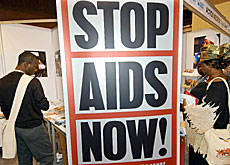Aids conference ends with call for cash

An international conference in the Thai capital, Bangkok, has ended with an appeal to increase funding for the treatment and prevention of Aids.
Roger Staub, head of the Swiss Federal Health Office’s Aids section, told swissinfo that history would judge the meeting as a turning point in the fight against the disease.
The 15th International Aids Conference focused on the politics of getting more anti-retroviral drugs to the millions of HIV-infected people in the developing world.
An estimated 38 million people are infected with HIV, 25 million of them in sub-Saharan Africa.
The former South African president, Nelson Mandela, called on the international community to make good on financial promises made to the United Nations-sponsored Global Fund.
The fund is the brainchild of UN Secretary-General Kofi Annan and aims to present a global, unified front against HIV and Aids.
Staub, who headed the Swiss delegation in Bangkok, called on Switzerland’s business community to set aside more money to help bring the global Aids epidemic under control.
swissinfo: Was this Aids conference anything more than a talking shop?
Roger Staub: The Swiss delegation has the strong impression that people will look back on this meeting a few years from now and remember it as the turning point in the fight against the Aids epidemic.
It was really moving to see how leaders in their field from the whole world – scientists, activists and people living with the disease – came together in Bangkok. And I really do have the sense that the world has finally woken up to the fact that it is facing the biggest humanitarian crisis it has ever seen.
swissinfo: You say the conference will be seen as a “turning point” in the fight against Aids. But do you have a sense that the tide really is turning?
R.S.: I hope so. Two decades ago we called for action in Africa and took action in the developed world. But the cry for help in Africa was not heard and we know what has happened there over the last 20 years.
Many countries in Asia and eastern Europe are now at the same point Africa was at 20 years ago, and I think the world now understands that if we sit back and do nothing we will face another disaster.
swissinfo: Is the international community any more prepared after this conference to invest in Aids prevention campaigns in Africa and elsewhere?
R.S.: The UN’s Global Fund needs more than SFr5 billion ($4.04 billion) next year, and we heard this week commitments from countries – including the United States and Canada – to donate major sums to help meet this target.
But I really hope that this call for money will also be heard by Swiss industry and Swiss banks. We are lucky in Switzerland because we are a rich country, and have to a large extent been able to control Aids here.
We have to bring back the message that the world is also waiting for a donation from Switzerland. We cannot just sit back with our wealth and be happy that we don’t have a real problem with Aids.
swissinfo: Did any countries attending the conference express an interest in Switzerland’s own Aids prevention campaigns?
R.S.: Yes. Switzerland has been seen as a role model in the work against Aids for many years. Here in Bangkok a number of countries have been asking us about projects we run, including our needle exchange programmes and the public education campaign called “Stop Aids”.
swissinfo: What is the message that the 20,000 delegates in Bangkok will be taking home from the conference?
R.S.: Everyone here has woken up to the need to tackle the Aids epidemic. But the question is whether we can wake up our governments, non-governmental organisations and private companies, and persuade them to act now.
The Swiss delegation is determined to return home and do everything possible to encourage those who can help us to join in the fight against the disease.
swissinfo-interview: Ramsey Zarifeh
The six-day International Aids Conference was the 15th of its kind.
This year’s event drew nearly 20,000 scientists, policy-makers and Aids activists.
The next conference will be held in Toronto, Canada, in 2006.

In compliance with the JTI standards
More: SWI swissinfo.ch certified by the Journalism Trust Initiative










You can find an overview of ongoing debates with our journalists here . Please join us!
If you want to start a conversation about a topic raised in this article or want to report factual errors, email us at english@swissinfo.ch.